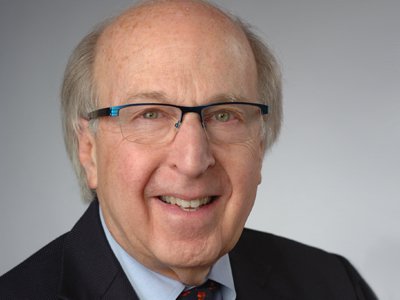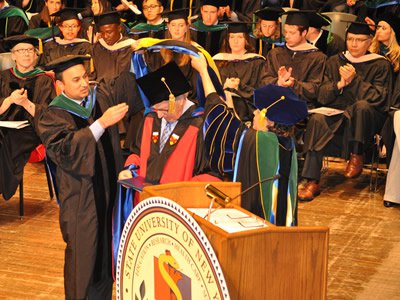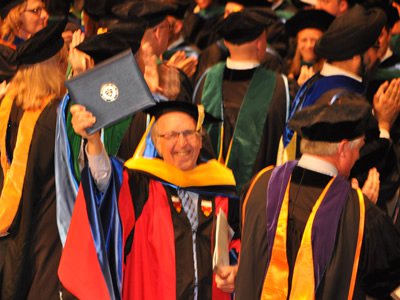Remember the Artist
A&S professor addresses students at Upstate Commencement

Editor's Note: On May 22, Samuel Gorovitz, professor of philosophy and former dean of Syracuse's College of Arts and Sciences, was recognized by the State University of New York (SUNY) for his contributions to medical science. Before a packed crowd at the Oncenter Complex, he received an honorary doctor of science degree. (Gorovitz shared the honor with Delos Cosgrove, president and CEO of the Cleveland Clinic.) The following is a full transcript of Gorovitz's remarks at Upstate Medical University's 2016 Commencement. He points out that it was meant to be heard, not read.

I’ll make some remarks to the graduates, and the rest of you may listen in as eavesdroppers if you’d like.
I stand here in astonishment that I have received such a stunning honor. How did I get to this? That question makes me think of what I owe to those in my past: parents, teachers, supportive family, splendid enriching and inspiring colleagues, helpful and generous friends and generations of students from whom I have learned so much.
Some of you may also be astonished finally to be here. Surely, as your dean, classmates and president have emphasized, you all are mindful of the debts of gratitude you owe for the gifts in your past that enabled you to do it, along with your own hard work. But your thoughts will properly focus on what lies ahead.
As you think now mainly about your future, you see this antique guy and may expect that I’ll talk mostly about that past that got me here, including some very hard work of my own. So these are two different lenses on time: past and future.
I want to talk about time, especially how we might think about the relationship of past to future.
Raise your hand if you have a bank account—any kind. Good!
You make withdrawals as you need to, and you can make deposits from time to time to increase the balance. I trust you are learning to be careful and mindful about how you manage your money. It’s important, and physicians are notoriously bad at it.
Now consider your time account. You have a certain amount of time in your account. Every minute of your life is a withdrawal from that account, and no deposits are possible. The balance steadily, inexorably, only declines. Recognizing this should prompt you to think very carefully about how you spend those minutes.
There’s been an emphasis on the importance of stories today. I’ll tell you a story about someone who thought carefully and courageously about his past and his future:
An American priest, working in Italy, was riding in the Tuscan countryside on his Vespa—one of those ubiquitous little motor scooters that seem to swarm and sound like big mosquitos in the cities. He passed a cottage with a lovely garden in front being tended by a beautiful, young Italian girl. He rode another kilometer or two, stopped, said aloud to no one in particular “It’s just not worth it,” turned his Vespa around, found the girl, and introduced himself.
How do I know? He told me this in his dining room in Bethesda, Md. Also there was his wife, who years earlier had been tending that garden in the Tuscan countryside when he appeared. He was working at the National Institutes of Health on ethical issues in health care, still deeply concerned with matters of value, of right and wrong, of character and principle. He had not shed his past, he redirected it.
Your past informs your future but does not determine it. You can always redirect your Vespa.
Now, two local redirection stories:
An opera singer decided a performer’s career was too uncertain and perilous, so she became an arts administrator. At 31, she applied to medical school. When I met her, she was a physician on the clinical faculty here at Upstate.
And a pediatric ICU nurse became an artist whose nationally admired work illuminates the plight of children who suffer from abuse or poverty.
The perspectives these two people have are not narrowly professional. They are interdisciplinary. They bring the artist’s attributes—a sensitive ability to listen, to notice, to use all kinds of detectors—to bear on the well-being of others.
These stories have current relevance because patients are not commodities—they are not just or primarily physical bodies to be examined and fixed. Personal relationships are at the core of effective health care. But too many doctors have narrow, technical perspectives.
Whatever area of medicine you pursue, you will have direct interactions with patients: opportunities to provide hands-on care and also to raise or lower their anxiety, to reinforce or undermine their trust, to make them feel respected or demeaned.
Bring your whole past to bear on those encounters—all you have learned, seen and felt—not just your professional training. Remember the artist—and there’s some artist in every one of you—and try to notice what others too often miss.

One final story. Years ago I visited a hospital in London, where there had been many problems of quality control in the care of elderly patients. Finally, in desperation, the CEO put the nurses in charge of the doctors. Some of the doctors quit. But patient outcomes improved dramatically. Doctors don’t like hearing this story.
One challenge often faced by nurses is how to decide what the right thing to do is in a difficult situation. And another challenge at times is how to get away with doing the right thing if the doctors are too limited in their vision to understand it. It is an ongoing responsibility for nurses to care for their patients, in part, by educating the doctors about the patients.
Good doctors respect and listen to their patients, to nurses, to other health professionals, all of whom can enlarge their vision, deepen their understanding and help them remember this: No two patients are the same person, and who the patient is can matter as much as what the patient has.
I’m out of time at this podium. But I’m not done with time. There’s plenty left in my account. And I’m resolved to use it henceforth to live up to this high honor, to reflect well on SUNY not by the past work I have done that got me here, but in what I do as you and I go forth together to make the world better through our efforts.
I’ll be mindful and deliberate about how I spend each minute from my time account. Please do the same.
Congratulations, and thanks for listening.
